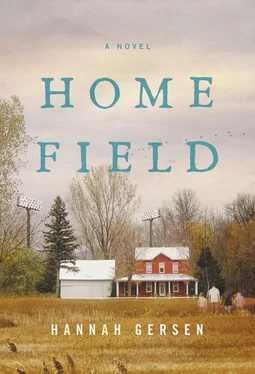“My brother’s missing,” Stephanie said. She began to cry, and everyone turned toward her. Just when life was getting better, she was plunged back into loss.
THE MOON ILLUMINATED the bare branches and the pale undersides of newly fallen leaves. The soft blue light made the woods less frightening, but also more cinematic, adding to Dean’s sense that what was happening was not really happening. A half mile away, Robbie’s classmates were gathered around a campfire, toasting marshmallows and telling ghost stories; Dean could smell the smoke on the breeze. They all knew about Robbie; they all knew and had been instructed not to worry, their teachers accomplices in this fiction, handing out chocolate bars and graham crackers. Why weren’t they all out here with flashlights, an army of children to find his son?
“Goddamn,” Dean said, running his hand over his face. He kept walking through spiderwebs. The feeling of the sticky threads on his nose and mouth was like being lightly suffocated.
“I can take the lead,” said Ian, the Outdoor School’s director.
“I’m fine,” Dean said. He was furious. He didn’t want to walk behind this bearded, high-strung hippie who spent his days in the woods teaching children how to use compasses and bows and arrows, as if preparing them for the apocalypse. Ian had a whiff of paranoia about him. He’d told Dean at least four times that they’d used this orienteering test for years, that it was age-appropriate and well supervised, and that no one had ever gotten lost, at least not for this length of time. Dean wanted to tell him to relax, he wasn’t going to sue the school, but at the same time he was annoyed that this man he’d just met was basically asking to be let off the hook. As if that was what mattered. Who cared how any of this had happened? He wanted his son back.
They’d been walking for almost two hours, starting from the school and retracing Robbie’s steps as best they could. Ian showed Dean where the test began, at a large limestone rock that was nicknamed “Pirate Rock” for its shiplike shape. It was one of dozens of boulders scattered throughout the woods, the remnants of some long-departed glacier. Dean used them as landmarks, something to keep him going; he would trick himself into believing that Robbie might be curled up behind one and he would stride toward it eagerly, some part of him actually expecting to find his son. He felt prone to delusions, his body pumped up on stress hormones. He tried to be rational, tried to talk himself down: You’re high on adrenaline and cortisol; take it easy, Dean, take it easy.
He was disturbed to notice that there was an edge of giddiness to all these feelings. He felt just as he had the week after Nicole’s death, when there was so much to do, immediately, and he was cast in the role of leader. His strongest memory of that time was not of the funeral, or of the burial, or of all the visitors who came by the house, but of eating alone, late at night, filling a plate with cold fried chicken and macaroni and cheese and coleslaw and soft rolls, his appetite so huge it was as if he were back in college, recovering from a hard practice, his body ruling him, demanding attention, his mind placid. Nicole’s absence wasn’t yet real to him, although it had been during the hours immediately following her death, when he had been allowed to view her body. He’d braced himself for something grotesque — her face bloated, her tongue hanging, her neck broken — but instead her eyes were shut and she looked placid, her skin pale and faintly gray, as if she’d been lightly erased. She was wearing a sleeveless button-down shirt, the collar partially obscuring the rope burn that crept up past her ears. Dean pulled the collar away from her neck to see the full extent of the damage. Something in him had to know. As he gazed at the dark red bruising, he had an out-of-sync thought: Somebody strangled her. For the briefest of moments, he had a fantasy of revenge. He was going to get whoever had done this awful thing to his wife. But then he realized he was looking at the murderer.
“She didn’t suffer,” the coroner said, watching him. “She would have lost consciousness immediately.”
Dean had straightened Nicole’s shirt, embarrassed.
“Make sure your kids know she didn’t suffer,” the coroner said. “Especially your son, the one who saw her. He’s probably going to have some questions.”
“Okay,” Dean promised. But as soon as he got back outside, some survival gene kicked in and sent a message to his body to disregard those strange, protracted minutes with a complete stranger and his wife’s dead body, to keep them separate from his daily mind.
“There’s the fire road.” Ian pointed ahead, where a break in the trees was barely visible. “There’s a good chance Robbie hit this same spot. The question is, would he have walked on the road or gone back into the woods?”
“I don’t know,” Dean said. And he really didn’t. Of his three children, Robbie was the one he knew the least.
“If you take this road north, it dead-ends, but obviously it hits the main drive if you go in the other direction. Hard to believe he could have walked on the main drive undetected.”
Not that hard to believe, Dean thought. How and when the school lost track of Robbie was unclear to Dean and, it seemed, also to the teacher who had been supervising him at that time. She had not been able to stop crying when Dean questioned her. Dean’s conversation with Kyle, Robbie’s orienteering partner, had not gone much better. Dean knew Kyle well — the boy had stayed overnight several times, although it occurred to Dean that it had been a long time since Robbie had hosted a sleepover or been invited to one. When he spoke to Kyle, he sensed that something had been lost in the boys’ friendship, something that neither Kyle nor Robbie was even aware of. All Kyle would say was that Robbie had been walking slowly, and that he had gotten tired of waiting for him.
“You’re supposed to stay with your buddy,” Dean said. “That’s what the buddy system is.”
“He didn’t stay with me!” Kyle said, his freckled face going red. And then Ian had intervened, with soft words for Kyle, and even softer words for Dean, assuring him that the children knew and understood the concept of the buddy system. This was before the police had been called, when Ian probably thought the whole thing was going to blow over, that Robbie would show up for dinner, like a dog. But then he didn’t. And then after dinner, another boy — one Dean didn’t know — volunteered that he had seen Robbie removing money and candy and a flashlight from his bunk drawer right before they gathered for orienteering class. This corroborated something Bryan had said, which was that Robbie had emptied his shoebox bank when he was packing.
So he had planned it. Dean remembered Robbie’s insistence on a new flashlight, extra batteries, new gloves, new boots. He didn’t know his son could live with that level of deception.
They had reached the fire road, and without the trees overhead it seemed almost bright. Dean remembered Nicole telling the boys that the moon was a nightlight for the animals.
“I think we should take this back to the main road and check in with the others,” Ian said.
“Can’t you check in with that?” Dean pointed to his walkie-talkie.
“I still think we should get back. What if there’s news? It’s better for you to be in a more centralized place.”
“Okay,” Dean said, barely mustering a shrug. It felt stupid to head back, but it was probably even stupider to walk aimlessly in the woods, hoping to find your child by trial and error.
“We’re going to find him,” Ian said. “He’s a smart kid, and I’m sure he’s taking care of himself. There’s nothing dangerous in these woods. Just deer and squirrels.”
Читать дальше












